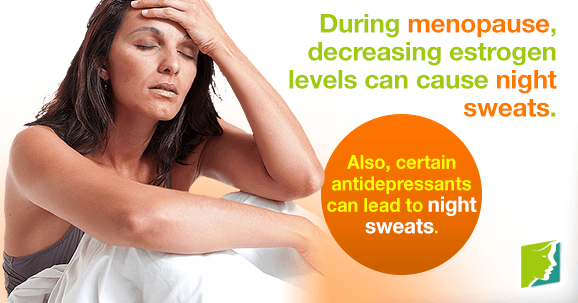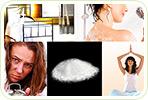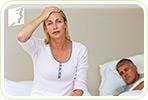Night sweats can disrupt sleep and be uncomfortable and disorienting. Night sweats are characterized by heavily perspiring and overheating at night. Night sweats can frequently be followed by chills as the body tries to regulate its temperature. Around 75% of women in the Western world report experiencing night sweats, chills, and hot flashes during menopause.
What Causes Night Sweats and Chills?
Night sweats are correlated to menopause, and decreasing estrogen levels play a role in night sweats. However, it is still not well understood exactly how or why night sweats happen.
Hot flashes and night sweats may be caused by a woman's core body temperature decreasing. Every person has a thermoneutral zone. This is a range of temperatures that that a person's body core can be in order to maintain an overall comfortable body temperature that does not require sweating or shivering. Some people have a very small thermoneutral zone, which means there body is more like to perspire or shiver when slight temperature changes happen.
Estrogen, certain antidepressants, and a few other brain chemicals and drugs can widen the thermoneutral zone. Because women have less estrogen during and after menopause, their thermoneutral zone can shorten significantly, leading to hot flashes, night sweats, and chills.
What Triggers Night Sweats?
Although brain chemistry and the body often determine whether or not someone is prone to hot flashes, night sweats, and chills, certain things can trigger them. Triggers can be due to a person's environment, psychological state, and lifestyle. The following lists compile common triggers of night sweats for women, but different women have different triggers, so all of these may not apply to you.
Environmental triggers:
- Excess bedding
- Overly-warm room temperature
- Warm weather
- Saunas
Emotional triggers:
- Stress
- Anxiety
- Depression
Lifestyle choices:
- Eating spicy foods
- Alcohol or caffeine consumption
- Smoking
- Drug use
How to Manage Night Sweats
The most effective method for reducing night sweats caused by menopause is hormone replacement therapy. However, hormone replacement therapy does have side effects and increases the risk of developing certain diseases and medical conditions.
Seeing a doctor is also important because chills and night sweats can be a symptom of some underlying medical conditions, and a healthcare professional can help rules those out as a cause of night sweats and chills. Talk to your doctor to learn more about hormone replacement therapy, lifestyle changes, and other methods to treat night sweats and chills during menopause.
Sources
- Harvard Women's Health Watch. (2009). Perimenopause: Rocky road to menopause. Retrieved October 2, 2015, from http://www.health.harvard.edu/womens-health/perimenopause_rocky_road_to_menopause
- Mayo Clinic Staff. (2014). Night Sweats. Retrieved October 2, 2015, from http://www.mayoclinic.org/symptoms/night-sweats/basics/definition/sym-20050768




